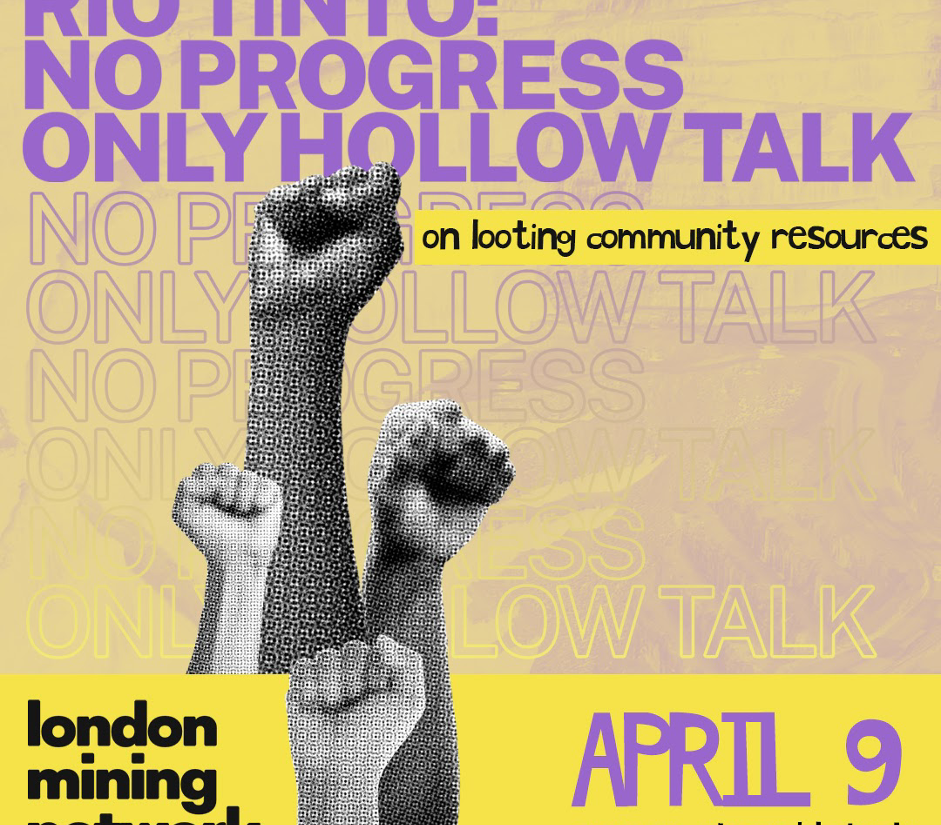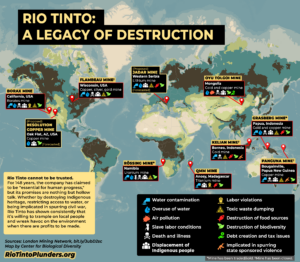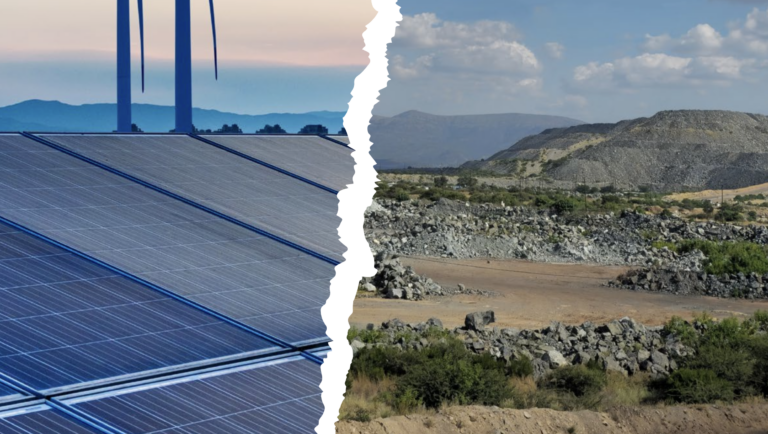
Rio Tinto: No progress, only hollow talk
As Rio Tinto prepares for its 9 April Annual General Meeting, campaign groups from five continents have come together to pressure the company to meet its commitments and answer demands from mining-affected communities. Under the title “Rio Tinto: No Progress, only Hollow Talk”, the coalition is taking the mining giant to task over its claims to support ‘human progress’ while its actions devastate communities and environments across the globe.

By highlighting several sites around the world where Rio Tinto is failing to live up to its own rhetoric, the campaign amplifies the voices of those calling for justice and unites resistance to exploitative extraction. You can find an overview of all the cases here(opens in new window) .
Broken promises
We want to draw attention to four key areas:
- erasure of indigenous heritage,
- water stress,
- environmental harm, and
- the looting of natural resources.
In each of these areas, Rio Tinto has made promises it has not kept. Therefore we have formulated a number of demands for Rio Tinto(opens in new window) to address urgently.
Oyu Tolgoi mine
For the Oyu Tolgoi mine in Mongolia, our demands are:
1. Socio-ecological justice:
- Disclose the water recycle and water resource availability for the lifespan of the mine, with information based on scientific calculations and measurements. This information is essential for risk assessment, as well as establishing compliance/non-compliance with Provisions 6.10, 6.11, 6.12, 6.13.1-3, and 6.19.2 of the Oyu Tolgoi Impact Assessment.
- Carry out the environmental and social impacts assessments for its underground mine construction and operations, including the new tailing storage facility section as per the Resolution #92 of the Parliament of Mongolia (November 2019), as well as the recommendations of the Multidisciplinary Team Report (2017 MDT/IEP, p. 26/2289).
- Respect for Mongolian nomadic cultural heritage and unique ecology, and support for its ability to thrive by implementing activities committed under the Complaint Resolution Agreement (2017).
2. Economic justice
- Refrain from using mailbox subsidiaries for arbitration or tax purposes – like Oyu Tolgoi Netherlands B.V. in Amsterdam – and work towards abandoning Rio Tinto’s presence in tax havens altogether.
Stop shifting profits to tax havens, and instead ensure that taxes are paid where profits are generated and real economic activity takes place; Provide transparency about all tax related to Oyu Tolgoi, by publishing Oyu Tolgoi LLC’s annual accounts in an unconsolidated manner. This would provide the Mongolian public with more detailed information with regard to Oyu Tolgoi’s contributions to Mongolia’s public revenue; Commit to a joint review and the renegotiation of the Oyu Tolgoi Investment Agreement (OTIA) together with the Government of Mongolia. In line with Rio Tinto’s recent willingness to renegotiate the Oyu Tolgoi Underground Mine Development and Financing Plan
an admission of the need to renegotiate the OTIA could allow Rio and the GoM to reach a fairer division of the mine’s revenues, allowing for economic justice for Mongolia and a more stable relationship between the two parties; Remove the fiscal stabilisation clause and tax holidays, to develop a more constructive and sustainable relationship between Rio Tinto and the Mongolian Government; Include stakeholders less influenced by short-term political interests and more by long-term sustainable development, such as local civil society, affected herder communities, and environmental governance and resource governance experts, to better meet the needs of the Mongolian people and the protection of the Mongolian environment.
3. Abort the UNCITRAL arbitration process
- The Oyu Tolgoi Investment Agreement includes so-called Investor State Dispute Settlement (ISDS) clauses. An ISDS clause allows investors to sue host governments in the case of investment disputes, and they can do this under United Nations Commission on International Trade Law (UNCITRAL) rules. Originally intended to stop arbitrary abuse by states singling out foreign investments, ISDS has devolved into a mechanism that allows corporations to interfere with a state’s sovereign right to legislate in their people’s public interest.
- By extension, the arbitration by UNCITRAL is by definition flawed, costly and unlikely to favour Mongolian’s public interest.
4. Provide transparency about the energy source and energy consumption of the Oyu Tolgoi mine.
What can you do?
Send Rio Tinto a message and tell them what you think!(opens in new window)
Related news
-
 The Counter: strengthening the fight for climate justice around the worldPosted in category:Long read
The Counter: strengthening the fight for climate justice around the worldPosted in category:Long read Luis ScungioPublished on:
Luis ScungioPublished on: -
The hidden harm of green hydrogen Published on:
 Ilona HartliefPosted in category:Publication
Ilona HartliefPosted in category:Publication Ilona Hartlief
Ilona Hartlief
-
 ExxonMobil sues the Netherlands over gas field closurePosted in category:News
ExxonMobil sues the Netherlands over gas field closurePosted in category:News Bart-Jaap VerbeekPublished on:
Bart-Jaap VerbeekPublished on:

